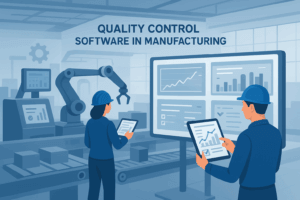ERP simplifies the management of business areas such as finance, inventory, sales, and HR in such a way that they work on a single platform. It provides visibility into common operations, supporting companies to make informed decisions at a much quicker pace.
With fast-growing technological advancements in the UAE market, small and medium enterprises (SMEs) are now being forced to invest in the best ERP software available in the UAE. Specifically, Cloud ERP UAE solutions are gaining a lot of attention owing to their cost effectiveness and ease of implementation.
The Benefits of ERP for the SME sector
1. Improved Business Performance
ERP systems offer somewhat the quickest benefits in automating some mundane manual processes. Generation of invoices, and inventory tracking—ERP systems make life a lot easier, allowing your team to concentrate on growth.
In a competitive economy, UAE Cloud ERP solutions have enabled smooth operations whether remote teams or in-house teams are in play.
2. Better Financial Management
Doing it manually could result in unpredictable errors and inefficiencies. Thus ERP has powerful financial management tools encompassing accounting, budgeting, and reporting processes and functions, allowing for maximization of cash value.
Knowing how ERP can help in forward financial management is key in this area. This creates timely insights on cash, expenses, and profit margins that allow SMEs to make critical financial decisions based on real-time information.
3. Centralization of Data and Enhanced Collaboration
One single version of the data across ERP systems provides the utmost clarity for the organization. This centralization leads to effective collaboration across departments as teams gain the ability to access meaningful, truthful information that is current.
Reduced lag in internal functioning is one of the top advantages of ERPs for startups from the UAE due to improved communication and faster decision-making, which are two key aspects of moving to scale.
4. Scalable and Versatile
With the growth of the company comes the development of operational jumping. ERP systems have been built keeping the capability to grow as the need arises, while also allowing for customized modules fitting the operational need.
The best custom cloud ERP solutions across the UAE can adapt according to changes in the operational environment without putting a stop to the operations.
5. Improved Customer Relationship Management (CRM)
There are many ERP systems that have integrated CRM modules which enable businesses to know and thus connect better with their customers, leading to personalized marketing approaches and improved customer service.
In the UAE, ERP-driven CRM solutions are invaluable to SMEs as the customer experience remains a strong competitive differentiator.
6. Enhanced Data Security and Compliance
The assumption of today’s business is that data security has become paramount. ERP systems have gone up to running highly-valued security functions in providing data protection for mostly sensitive information.
Furthermore, enterprise resource planning benefits come with built-in compliance tools that help ensure adherence to local and international laws.
7. Cost Reduction and Return On Investment (ROI)
While the ERP solution might seem fairly expensive for the smaller businesses in the United Arab Emirates, the long-run return is immense. This can be attributed to the fact that ERP systems save quite a lot since manual errors are reduced, operations are streamlined, and resource allocation is improved.
And the benefits in sustained productivity and reduced operational cost provide evidence of ROI as SMEs implement ERP.
ERP vs Traditional Business Management Software
Traditionally, company management software handled a limited number of functions, resulting in data silos and competing operations. ERP software, as opposed to traditional ones, aids in the automation of corporate processes. Not only that, ERP systems improve business administration by providing capabilities such as automated reporting and workflow optimization.
Choosing the Best ERP Providers in UAE
When choosing an ERP solution, the company must choose a provider who understands the unique needs of the SMEs in the UAE. Vendors should include:
- Scalable and cloud-based solutions
- Comprehensive support and training
- Industry-specific ERP modules for SMEs.
If you’re in doubt about where to start, you might want to consider free ERP consultation UAE services to help you select an appropriate solution for your business.
How to Ensure Successful ERP Implementation in UAE
To get the best out of ERP implementation in the UAE, it is advisable to adhere to the following practices:
- Assess Your Business Needs: Pinpoint the key functions that ERP can influence.
- Choose the Right ERP Solution: Take into account size, cloud-friendliness, and vendor reputation.
- Engaging Key Stakeholders: Ensure that all departments are on board with the advantages.
- Provide Training: Full training will help the process of adapting a lot smoother.
- Monitor and Optimize: Consistent checks will make sure that the functioning of the business is getting fulfilled.
Final Thoughts: Invest in ERP for Sustainable Growth
ERP systems have become imperative to SMEs and are not considered a luxury for big companies. The best ERP software UAE solutions provide unparalleled benefits in better efficiency and finances, better customer engagement, and data security.
If your proposal incorporates ERP software for small businesses in the UAE, now is the time to take action. Invest in the right solutions, partner with the best ERP providers in UAE, and create a plan for the business that will guarantee sustainability.
Take the first steps toward digital transformation! Learn ERP case studies for UAE SMEs and see how it can help your business thrive.


